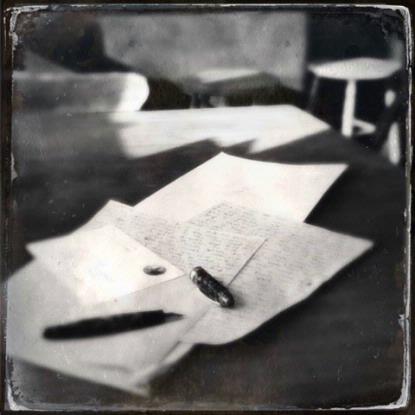
For years I wrote letters. “Have you ever heard of The Collected Phone Calls of Gertrude Stein?” Rita Mae Brown says in Starting from Scratch. “Writers should learn to write letters and save the telephone for business.”
I took her words to heart. Not just because I was a writer, but because I loved the looseness, the intimacy of the form. No word-count limits. No thesis statement, no final paragraph with the thesis reworded, biting itself in the tail like an ouroboros. No lede to grab the reader, draw him in, keep him reading. Sure, if you begin with a few choice words—“He finally asked, and I said yes,” “Remember how I told you I wanted a baby,” “I’ve decided to leave”—you might thrill your correspondent, but even if you don’t he’ll read on, because the fact of the letter, no matter how prosaic its contents, means you were thinking of him, you took the time to write.
Instead of rules you have this: a blank page in front of you, or a napkin, a flyer advertising flamenco music in some foreign city with empty space on the back, a postcard, and all you have to do is pour your heart out on it. You’re allowed to ramble, to be boring for a paragraph or two—it’s a letter, after all: your recipient will be glad to get it anyway, to walk to her mailbox in the country on a spring day, her feet bare for the first time in months, gravel sticking to the soles of her feet and the gravel of a long winter still sticking to her soul, and pull out the thin blue envelope, the fat pink envelope, the envelope made from a perfume ad, from a photo of cupcakes torn from a cooking magazine.
Inside she finds the sights and sounds and stories of your day, your week, your year: “I’m sitting in a café in Rome, and a boy—honestly, he’s just a boy!—has been flirting with me for an hour. ‘Please,’ he keeps saying, and he tosses his head back, not a dark hair on his head displaced.” “On the bus this morning I saw a little girl who looked just like you at five or six. Made me miss you so much I had to write.” “I spend a couple of hours at Grandma Lee’s house most days. It’s funny how even so deep into dementia—she barely ever knows who I am—she has moments of lucidity. She was telling me about meeting her first husband the other day, when they were young teenagers, right before the war. She was only fifteen and felt so certain she’d met the person she was going to grow old with.”
Rita Mae Brown didn’t anticipate the especial conundrum: email, which almost feels as if it could approximate letter writing. And it’s instant, and closer to carbon free, and you don’t have to put a stamp on it. But think of what you’ve lost. You’re no longer making your friend puzzle through the tangled briar of your handwriting, and she can’t see where your tears have fallen and blurred your words. She’s not holding the same pages that you were holding days before, in some near or far city or town. As for speed, why should that be an advantage in human communication? Isn’t it more spacious, restful, to know that I wrote you this letter over several days—you can see that I headed sections “Monday,” “Thursday,” “Saturday—finally home”? I was in no hurry. By the postmark you know that it took several more to reach you. Now you read my words, ponder them, sit with them. Sometime, in an hour, a fortnight, a month, you might want to respond, but you take your time. “The tranquil heart may yet outrun/the rocket and the car,” said E. B. White, paragon of letter writers.
Me, I’ve come back to the fold. I gave email a chance, and it never delivered. Beloved friends have died, and I want to be intimately connected to the ones who remain while we still have the chance. I don’t want to send them emails. I want to send them a heap of scrawled pages, the shape of my days in words, and tell them what they mean to me. I want to tuck in poems and newspaper clippings, a pressed flower from my garden, a photo of my kids. I want to write them a letter.
Photo by Juno Lamb

